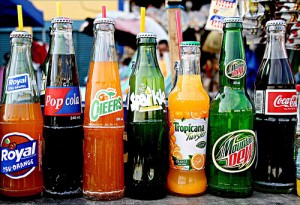
In a post a few weeks back, a lot of Feministe readers disapproved of taxing cigarettes, and had some interesting arguments that I, a supporter of such taxes, hadn’t previously considered. So I wonder: How do you all feel about taxing sugared beverages?
William Saletan seems to think that the tax would only apply to soda, but from the policy paper it looks like it would apply to any beverage with added sweeteners. I’m not a big soda drinker, but I do require a daily hazelnut Americano, which I imagine would be taxed. While I’m not a huge fan of the OMG OBESITY EPIDEMIC tone of the policy paper, I do agree that it’s reprehensible that soda is heavily marketed at kids, is sold in schools, and is often more easily available than healthier food products. And unlike other unhealthy foods, soda has zero nutritional value. I would certainly favor the soda tax if it were used to subsidize the cost of healthier foods, since access to healthy foods is more a class issue than anything else.
I’m not usually particularly interested in regulating what people put in their bodies, but since our government already subsidizes corn production (artificially driving down the cost of products sweetened with high-fructose corn syrup), and since the policy paper includes a proposal to use the tax money in furtherance of more equitable access to healthy food, I have less of an issue with this particular tax. Of course, I would prefer that we overhaul our agricultural and food production and safety policies entirely — and I would prefer we did it from a rights-based perspective instead of an obesity-prevention one — but that doesn’t look like it’ll be happening anytime soon. What do you all think? Should our soda be taxed?